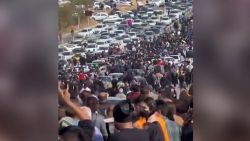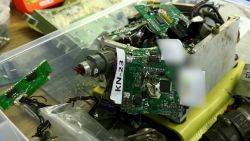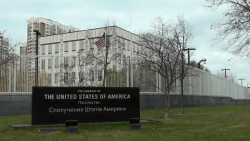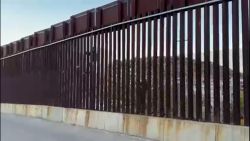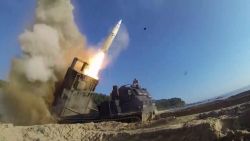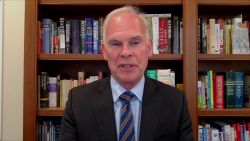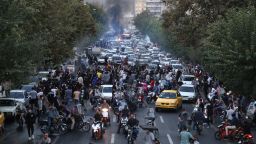Clashes broke out throughout Iran Wednesday as thousands of people came to the burial site of Mahsa Amini in Saqqez, a city in the Kurdistan province, to mark 40 days since her death, semi-official Iranian state news agency ISNA said.
Protests have swept through the Islamic Republic following the death of the 22-year-old Kurdish Iranian woman, who died on September 16 after being detained by “morality police” and taken to a “re-education center,” allegedly for not abiding by the country’s conservative dress code.
Nationwide protests took place in Iran on Wednesday to mark 40 days since Amini died, an important day of mourning in Iranian and Islamic tradition.
The unrest came on the same day that at least 15 people were killed and 10 others were injured in what appeared to be a terrorist attack at the Shahcheragh Shrine in the city of Shiraz, southern Iran. ISIS later claimed responsibility for the shrine attack, saying in a statement that one of its members had “targeted groups of Sunni refusal infidels inside the shrine with his machine gun.”
The state news agency ISNA said security forces “did not prevent” protesters from visiting Amini’s grave in Saqqez, which is also her birthplace, but reported that clashes took place after people left the site.
“There were no clashes between mourners and police at the burial site, most were chanting Kurdish slogans, some moved towards the city with the intention of clashes, one of them raised the Kurdish flag,” ISNA said.
In videos shared on social media, large crowds of people and lines of cars are seen making their way to Saqqez’s Aichi cemetery where Amini is buried. Groups of people in the videos are heard chanting “women, life, freedom” and “death to this child-killing regime.”
Other videos show plumes of smoke rising from several fires in the streets of a different neighborhood nearby. Gunshots are heard in the background while protesters march in the streets.
Video shared by Kurdish rights group Hengaw and verified by CNN shows security forces deployed in large numbers in Saqqez late Tuesday, after activists called for protests across the country to mark 40 days since Amini died.

Internet watchdog Netblocks said on Twitter there was a near-total disruption to the internet reported in Iran’s Kurdistan Province and Sanandaj from Wednesday morning. State news ISNA reported that following “outbreaks and scattered clashes” the internet in “Saqqez city was cut off due to security considerations.”
There is no law in Iran that says the government cannot ban religious ceremonies if the state believes there are security concerns.
The government has in the past banned and attacked religious ceremonies claiming safety reasons and have in other cases reached out to families to ask them to refrain from holding public mourning ceremonies.
Iranian state media IRNA said Amini’s family made a statement to say they will not be marking her passing on Wednesday.
Kurdish rights group Hengaw said the Amini family was “under a lot of pressure” from security forces to write that statement, adding they had threatened to arrest Amini’s brother if the procession took place.
Protests continue
Large protests broke out in Tehran on Wednesday, where security forces fired teargas at demonstrators mourning Amini’s death.
Video posted to social media showed demonstrators burning trash cans and throwing rocks. Security forces could be seen firing pellet guns in return.
A group of protesters in Tehran reported to be doctors and dentists were seen chanting “freedom, freedom, freedom!,” according to another video posted on social media. Another separate video shows teargas being fired in their direction.
Iran’s Islamic Revolutionary Guard Corps [IRGC] anti-riot units were seen marching in Tehran as the protests intensified on Wednesday, according to video posted on social media.
Similar units were firing on a group of doctors protesting in Tehran earlier in the day forcing the crowd to scatter, according to the person taking the video. It’s unclear what was being fired in the video.
Protests have also occurred at universities across the country including the University of Ferdowsi in Mashhad; Azad University in Karaj; Tehran’s Islamic Azad University Science and Research Branch; and Azad University – Kerman.
IRNA reported on Wednesday that the Sharif University of Technology in Tehran has announced that classes of new students will “continue to be held virtually until further notice” due to the “persistence of some problems and the lack of a calm environment.”
As the protests rage, international leaders have been condemning the repression of peaceful protesters by Iranian forces. The United States imposed a slew of new sanctions against Iranian officials involved in the ongoing crackdown on Wednesday.
Those targeted by sanctions include the commander of the Islamic Revolutionary Guard Corps’ intelligence organization and the IRGC’s deputy commander for operations, as well as two officials in the Sistan and Baluchistan province, “site of some of the worst violence in the latest round of protests,” the Treasury Department said in statement.
White House officials say that the United States fears Russia may be advising Iran on how to crack down on public protests, as clashes have broken out in Iran to mark 40 days since the death of Mahsa Amini.
“We are concerned that Moscow may be advising Tehran on best practices, drawing on Russia’s extensive experience of suppressing open demonstrations,” White House press secretary Karine Jean-Pierre said during Wednesday’s briefing. “The evidence that Iran is helping Russia wage its war against Ukraine is clear and it is public. And Iran and Russia are growing closer the more isolated they become. Our message to Iran is very, very clear – stop killing your people and stop sending weapons to Russia to help kill Ukrainians.”
United Nations experts called for an independent international investigation into the crackdown.
The experts noted in a Wednesday statement that an “alarming number of protesters have already been detained and killed, many of whom are children, women and older persons,” as they called on the government to tell the police to cease the use of excessive and lethal force.
CNN’s Maegan Vazquez, Jennifer Hansler and Richard Roth contributed to this report.


